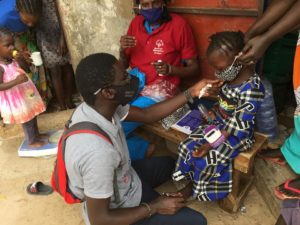 The Special Olympics movement aims to achieve the inclusion of people with intellectual disabilities (ID)—a marginalized group whose needs are rarely considered in emergency response, as in the COVID-19 pandemic, or even policy initiatives focused on the needs of the general population. Therefore, in the COVID-19 response, Special Olympics has been addressing the gap in accessible health information to move Special Olympics athletes (people with ID) towards behavior change as regards COVID prevention, as well as healthy lifestyles more generally.
The Special Olympics movement aims to achieve the inclusion of people with intellectual disabilities (ID)—a marginalized group whose needs are rarely considered in emergency response, as in the COVID-19 pandemic, or even policy initiatives focused on the needs of the general population. Therefore, in the COVID-19 response, Special Olympics has been addressing the gap in accessible health information to move Special Olympics athletes (people with ID) towards behavior change as regards COVID prevention, as well as healthy lifestyles more generally.
With physical activity as an integral component of mental and physical well-being and sport at the heart of Special Olympics’ mission, creating and providing resources to help athletes stay active at home has been a central focus during the COVID pandemic. In many countries, Special Olympics leveraged technology for a wide range of activities, from online fitness challenges and virtual competitions to mindfulness sessions to virtual health screenings. Countless partnerships—for instance, with UNICEF and government ministries in Montenegro—made it possible for approximately 82% of Special Olympics athletes surveyed to have remained in contact with someone from Special Olympics, be it a coach, teammate, or staff person.
However, considering that Special Olympics operates in every type of community in over 190 countries worldwide and that people with ID tend to be very marginalized, virtual activities were out of reach for many. In such instances, printing and distributing resources by mail or door-to-door delivery has been a crucial approach to help eliminate many of the barriers to healthy behaviors.
A key area of response to the COVID-19 pandemic with ongoing relevance on the road to UHC has been Special Olympics’ work to raise awareness of the health inequity and barriers to health that people with ID face. Developing resources to highlight this situation of inequity and support advocacy to remedy it, providing training to health care providers around the world, and boosting the knowledge and self-advocacy skills of people with ID and their families through training are part of Special Olympics’ work to ensure everyone is protected—in the COVID pandemic and beyond.
Promoting the inclusion of people with ID is Special Olympics’ mission. As the world looks to move beyond the COVID pandemic, Special Olympics will continue to promote a twin-track approach to inclusion of people with ID. This will include highlighting the high risk of this population being left behind if stakeholders do not take intentional action for inclusion, developing and delivering high-quality and effective interventions, and partnering to build momentum for inclusion and equity.
Watch Special Olympics Chief Health Officer Dr. Alicia Bazzano highlighting the vulnerability of people with ID during the COVID pandemic (and beyond) and what Special Olympics is doing about it:
To learn more: www.specialolympics.org
| In the lead-up to UHC Day 2020 (“Health for All: Protect Everyone”), we are highlighting how CSEM member organizations are contributing to ensure the COVID-19 response protects everyone and keeping momentum going for universal health coverage amid the crisis. See more.
Join us for the virtual UHC Day rally on 12 December 2020 — share your commitment to UHC and call on decision-makers to protect everyone! |

